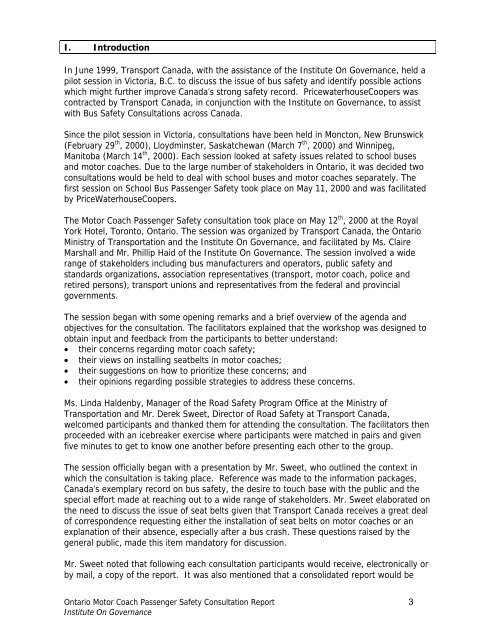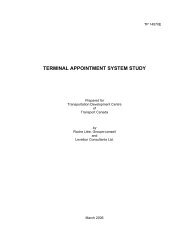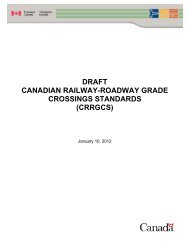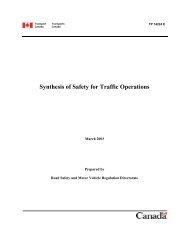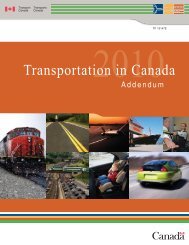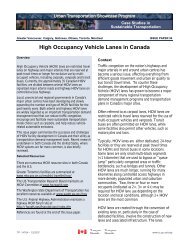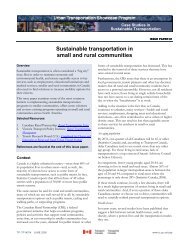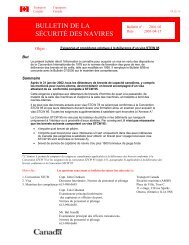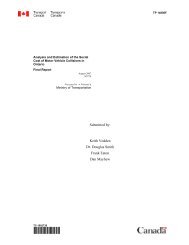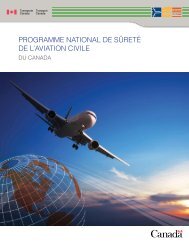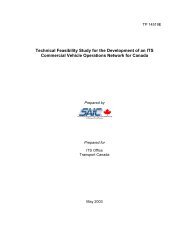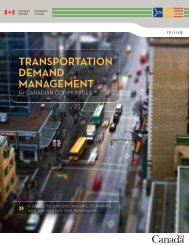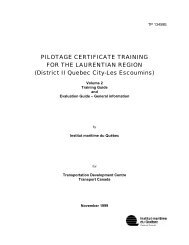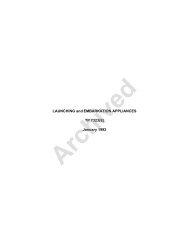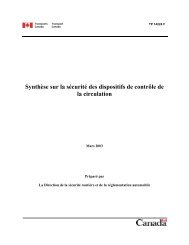Ontario Motor Coach Passenger Safety Consultation - Report -
Ontario Motor Coach Passenger Safety Consultation - Report -
Ontario Motor Coach Passenger Safety Consultation - Report -
Create successful ePaper yourself
Turn your PDF publications into a flip-book with our unique Google optimized e-Paper software.
I. Introduction<br />
In June 1999, Transport Canada, with the assistance of the Institute On Governance, held a<br />
pilot session in Victoria, B.C. to discuss the issue of bus safety and identify possible actions<br />
which might further improve Canada’s strong safety record. PricewaterhouseCoopers was<br />
contracted by Transport Canada, in conjunction with the Institute on Governance, to assist<br />
with Bus <strong>Safety</strong> <strong>Consultation</strong>s across Canada.<br />
Since the pilot session in Victoria, consultations have been held in Moncton, New Brunswick<br />
(February 29 th , 2000), Lloydminster, Saskatchewan (March 7 th , 2000) and Winnipeg,<br />
Manitoba (March 14 th , 2000). Each session looked at safety issues related to school buses<br />
and motor coaches. Due to the large number of stakeholders in <strong>Ontario</strong>, it was decided two<br />
consultations would be held to deal with school buses and motor coaches separately. The<br />
first session on School Bus <strong>Passenger</strong> <strong>Safety</strong> took place on May 11, 2000 and was facilitated<br />
by PriceWaterhouseCoopers.<br />
The <strong>Motor</strong> <strong>Coach</strong> <strong>Passenger</strong> <strong>Safety</strong> consultation took place on May 12 th , 2000 at the Royal<br />
York Hotel, Toronto, <strong>Ontario</strong>. The session was organized by Transport Canada, the <strong>Ontario</strong><br />
Ministry of Transportation and the Institute On Governance, and facilitated by Ms. Claire<br />
Marshall and Mr. Phillip Haid of the Institute On Governance. The session involved a wide<br />
range of stakeholders including bus manufacturers and operators, public safety and<br />
standards organizations, association representatives (transport, motor coach, police and<br />
retired persons), transport unions and representatives from the federal and provincial<br />
governments.<br />
The session began with some opening remarks and a brief overview of the agenda and<br />
objectives for the consultation. The facilitators explained that the workshop was designed to<br />
obtain input and feedback from the participants to better understand:<br />
• their concerns regarding motor coach safety;<br />
• their views on installing seatbelts in motor coaches;<br />
• their suggestions on how to prioritize these concerns; and<br />
• their opinions regarding possible strategies to address these concerns.<br />
Ms. Linda Haldenby, Manager of the Road <strong>Safety</strong> Program Office at the Ministry of<br />
Transportation and Mr. Derek Sweet, Director of Road <strong>Safety</strong> at Transport Canada,<br />
welcomed participants and thanked them for attending the consultation. The facilitators then<br />
proceeded with an icebreaker exercise where participants were matched in pairs and given<br />
five minutes to get to know one another before presenting each other to the group.<br />
The session officially began with a presentation by Mr. Sweet, who outlined the context in<br />
which the consultation is taking place. Reference was made to the information packages,<br />
Canada’s exemplary record on bus safety, the desire to touch base with the public and the<br />
special effort made at reaching out to a wide range of stakeholders. Mr. Sweet elaborated on<br />
the need to discuss the issue of seat belts given that Transport Canada receives a great deal<br />
of correspondence requesting either the installation of seat belts on motor coaches or an<br />
explanation of their absence, especially after a bus crash. These questions raised by the<br />
general public, made this item mandatory for discussion.<br />
Mr. Sweet noted that following each consultation participants would receive, electronically or<br />
by mail, a copy of the report. It was also mentioned that a consolidated report would be<br />
<strong>Ontario</strong> <strong>Motor</strong> <strong>Coach</strong> <strong>Passenger</strong> <strong>Safety</strong> <strong>Consultation</strong> <strong>Report</strong> 3<br />
Institute On Governance


